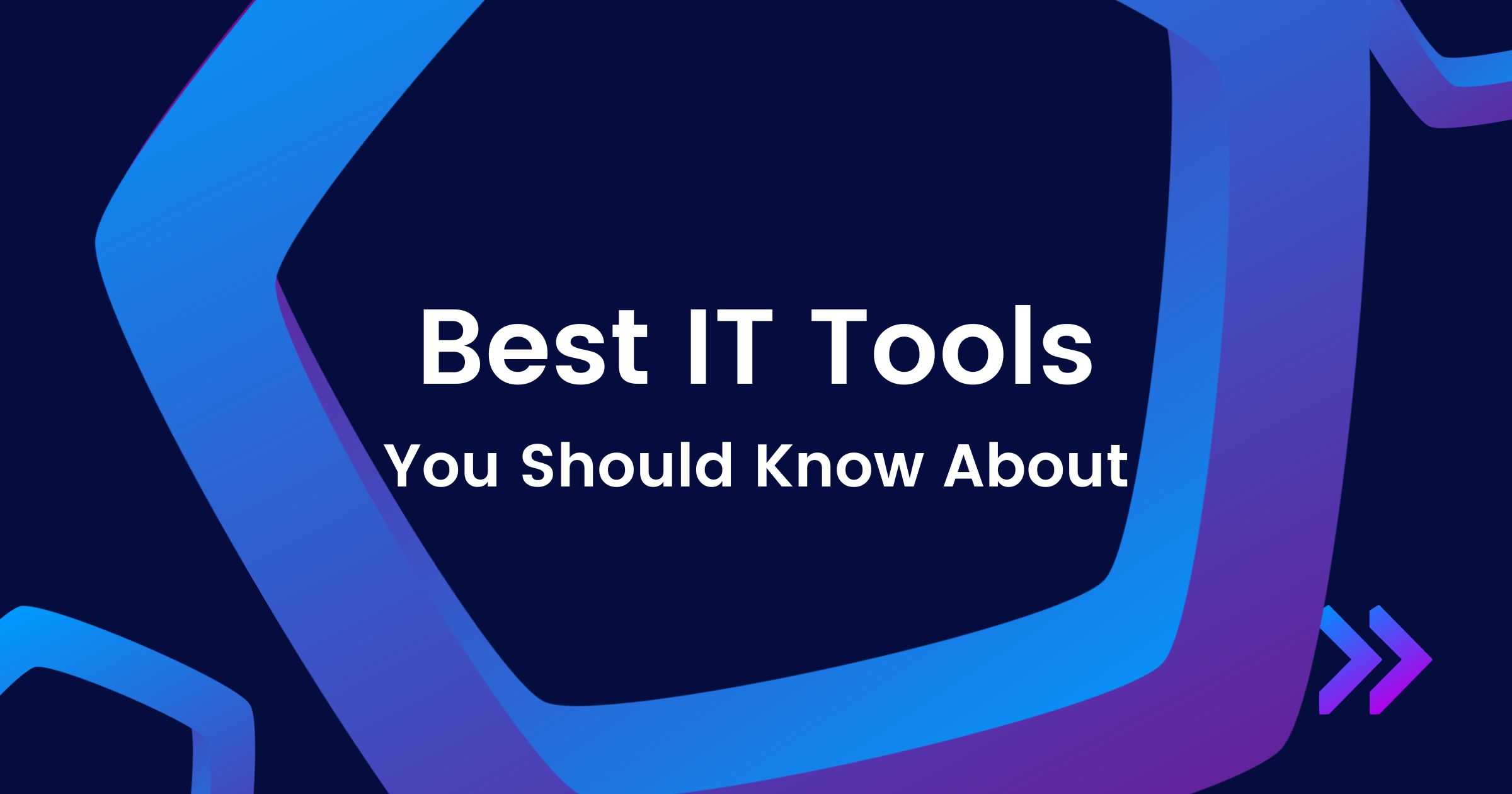
27 Must-Have IT Tools for IT Professionals
Ever felt overwhelmed by the vast world of Information Technology? You're not alone. With so many tools popping up every day, it can be tricky to know which ones truly make the cut. We've sifted through the noise to bring you the best IT tools that are not just game-changers but are also user-friendly. Whether you're knee-deep in server logs, juggling cloud platforms, or just hunting for that perfect password manager, our list has got you covered. Let’s roll in!
Top IT tools include:
- Wireshark
- Ansible
- Git/GitHub
- Docker
- ServiceNow
Here’s the complete list of the best IT tools:
Infrastructure Monitoring
1. Nagios
Known for server and network monitoring, offering both open-source and enterprise solutions.
Best for: IT teams needing robust monitoring solutions for diverse infrastructure components.
Nagios stands out as an industry leader in infrastructure monitoring. It ensures servers, networks, and applications function optimally, swiftly notifying teams of any anomalies. Both its open-source and enterprise editions cater to a wide range of operational needs and scales.

Network Analysis
2. Wireshark
A widely-used network protocol analyzer essential for troubleshooting and network analysis.
Best for: Network engineers and analysts diving deep into network activity and diagnosing issues.
Wireshark has become an indispensable tool in the realm of network analysis. It meticulously dissects network traffic, enabling professionals to diagnose network problems, analyze protocols, and educate themselves on intricate network operations.
Configuration Management
3. Ansible
Manages application deployment, configurations, and task automation across nodes.
Best for: System administrators and DevOps teams streamlining and automating complex operational tasks.
Ansible simplifies software provisioning, application deployment, and interim task automation. With its agentless architecture and extensive library of modules, it minimizes manual efforts and potential human errors across IT environments.
Version Control
4. Git/GitHub
An integral tool for code versioning and collaboration in software development.
Best for: Development teams, from solo developers to large-scale enterprises, managing codebase versions and collaborating on projects.
Git, bolstered by the collaborative platform GitHub, offers unparalleled version control capabilities. Its branching, merging, and tracking features, combined with GitHub's collaborative platform, have transformed how developers work on shared projects.
SaaS Discovery and Security Monitoring

5. Resmo
Essential for identifying and monitoring unauthorized SaaS app usage, ensuring a secure and compliant digital environment.
Best for: Security-conscious organizations needing oversight on their SaaS application usage landscape.
Resmo takes the reins in identifying unauthorized SaaS applications within an organization. By offering a clear lens into unsanctioned SaaS usage, it ensures IT environments remain secure, compliant, and optimized in a SaaS-dominant era.
Suggested reading: How to Find Shadow SaaS in Your Company

Collaboration and Communication
6. Slack
A team messaging app that centralizes communications and integrates with numerous other IT tools.
Best for: Modern teams, both small and large, aiming for fluid communication, file-sharing, and integrated workflows.
Slack revolutionizes team communication, offering organized channels, direct messaging, and file-sharing. Its rich ecosystem of integrations amplifies team efficiency, making it a staple in many modern workplaces.
Also read: Slack Security Tips
7. Microsoft Teams
A collaboration tool that integrates with Microsoft 365, offering chat, video conferencing, and file storage.
Best for: Teams, especially within enterprises, leveraging Microsoft's suite and requiring an integrated, all-encompassing communication platform.
Microsoft Teams is more than just a communication tool; it's a collaboration hub. With chat, meetings, and file storage at its core, it also offers deep integration with Microsoft 365 tools, ensuring streamlined workflows and enhanced productivity.
8. Trello
A visual collaboration platform widely used for task and project management.
Best for: Teams and project managers visualizing task workflows and project roadmaps.
Trello turns project management into a visual, intuitive experience. With its board and card system, teams can organize tasks, track progress, and collaborate in real-time, making project oversight transparent and interactive.
Virtualization
9. VMware vSphere
A preferred server virtualization platform in many enterprise environments.
Best for: Enterprises and IT professionals desiring a mature, reliable server virtualization solution.
VMware vSphere is a cornerstone in the virtualization market, providing tools for creating, managing, and scaling virtual machines. With its high performance, reliability, and extensive feature set, it remains a top choice for many organizations.

Backup and Recovery
10. Veeam
Reliable for fast and flexible recovery of virtualized applications and data.
Best for: Businesses of all sizes needing assured, efficient backups and quick recovery solutions for their virtualized workloads.
Veeam ensures that organizations never lose access to their critical data. With its capabilities to backup, replicate, and restore, it minimizes downtime and data loss, ensuring businesses remain resilient in the face of unforeseen challenges.
Endpoint Protection and Security
11. Symantec Endpoint Protection
Guards against various types of malicious software.
Best for: Organizations seeking a multi-layered defense mechanism against an evolving threat landscape.
Symantec Endpoint Protection offers a holistic approach to security, fending off malware, ransomware, and advanced threats. Its machine learning techniques, combined with behavior analysis, ensure endpoints remain uncompromised.
12. McAfee Endpoint Security
Comprehensive threat protection that integrates various defense mechanisms.
Best for: Businesses needing dynamic endpoint protection against complex threats across devices and operating systems.
McAfee Endpoint Security integrates various defense mechanisms, offering advanced threat intelligence, machine learning, and endpoint detection and response. This integrated approach ensures endpoints are shielded from modern-day threats.
Also see Top Cybersecurity Software Tools
13. Bitdefender GravityZone
A layered next-gen security platform for endpoints.
Best for: Companies requiring an adaptable, layered security platform for their evolving IT environment.
Bitdefender GravityZone brings together various protective technologies under one unified console. With its adaptive-layered architecture, it ensures robust protection against both common and sophisticated attacks.

Help Desk & IT Service Management (ITSM)
14. ServiceNow
Offers a suite of cloud-based ITSM tools, including ticketing and workflow automation.
Best for: Large enterprises and IT departments needing a scalable, cloud-based platform to streamline IT service management.
ServiceNow transforms IT service delivery with its automated workflows, self-service portals, and integrated ITSM processes. It simplifies IT operations, fosters user satisfaction, and promotes agile service delivery.
15. Freshservice
A cloud-based ITSM tool equipped with powerful automation features.
Best for: Organizations seeking a user-friendly, cloud-based ITSM solution with robust automation capabilities.
Freshservice offers a suite of ITSM features, from ticketing to asset management. Its modern, intuitive UI combined with powerful automation capabilities ensures IT teams efficiently address user needs.
16. Zendesk
Offers a suite of tools focusing on improving customer service and experience.
Best for: Businesses focusing on enhancing customer support experiences and streamlining service operations.
Zendesk stands as a pioneer in customer service solutions. Its suite of tools, from ticketing to knowledge base management, is geared towards elevating customer experiences and resolving issues efficiently.
Cloud Management and Monitoring
81% of organizations using more than one public or private cloud. (Cloud security statistics)
17. AWS Management Console
A comprehensive tool for managing resources in Amazon Web Services.
Best for: IT professionals managing resources within the Amazon Web Services ecosystem.
The AWS Management Console offers a unified view of AWS resources, simplifying their creation, management, and monitoring. With its intuitive interface, professionals can oversee a vast array of AWS services and optimize their cloud operations.
18. Azure Portal
Microsoft's cloud offering, suitable for a variety of services from databases to machine learning.
Best for: Enterprises and developers engaged with Microsoft's cloud offerings and services.
Azure Portal is the gateway to Microsoft's extensive cloud services, from databases to AI. It provides tools to build, manage, and monitor applications across multiple clouds, on-premises, and at the edge.
19. Datadog
A monitoring service for cloud-scale applications, providing observability into infrastructure and applications.
Best for: DevOps and IT teams requiring real-time metrics, traces, and logs across their cloud infrastructure.
Datadog provides end-to-end visibility into the health and performance of modern applications. With its extensive integrations, it offers real-time insights, ensuring proactive issue resolution and system optimization.
Container Management
20. Docker
Enables software to run reliably when moved from one computing environment to another.
Best for: Developers and sysadmins adopting containerization for software consistency and portability.
Docker revolutionizes software delivery by containerizing applications, ensuring they run consistently across various environments. It's pivotal for teams aiming for rapid, reliable, and scalable software deployments.
21. Kubernetes
An open-source container orchestration platform designed to automate deploying, scaling, and operating application containers.
Best for: IT teams and organizations scaling and orchestrating their containerized applications.
Kubernetes automates the deployment, scaling, and management of containerized apps. As the de facto standard in container orchestration, it offers robust tools to maintain high availability and ensure application resilience.
22. Rancher
Open-source software for delivering Kubernetes-as-a-Service.
Best for: DevOps professionals seeking an intuitive platform to manage Kubernetes at scale.
Rancher simplifies Kubernetes management, deployment, and scaling. It's a complete Kubernetes management platform that enhances the orchestration capabilities of Kubernetes, making it accessible to a wider audience.
Continuous Integration & Continuous Delivery (CI/CD)
23. Jenkins
An open-source tool that automates parts of the software development process.
Best for: Development teams implementing CI/CD pipelines for automated software builds, tests, and deployments.
Jenkins, an open-source automation server, streamlines the CI/CD process. It supports various plugins, ensuring seamless integration with many development, testing, and deployment technologies.
24. Travis CI
A CI service that can be integrated with GitHub repositories.
Best for: Developers, especially those using GitHub, needing continuous integration services for their projects.
Travis CI facilitates reliable build and test processes for software projects. As a cloud-based CI solution, it integrates seamlessly with GitHub repositories, ensuring code quality and swift feedback loops.
25. GitLab CI/CD
Offers continuous integration, delivery, and deployment within the GitLab infrastructure.
Best for: Organizations leveraging GitLab for source code management and seeking integrated CI/CD capabilities.
GitLab CI/CD extends GitLab's source code management features to offer continuous integration, delivery, and deployment within a unified platform. It automates the software delivery process, promoting rapid and consistent releases.

Password Management
26. LastPass
Helps in securely managing and storing passwords and other credentials.
Best for: Individuals and businesses needing a secure vault to store and manage their digital credentials.
LastPass offers encrypted storage for passwords, digital records, and other credentials. With its browser extension and mobile app, users can securely autofill passwords, ensuring both convenience and security.
27. 1Password
Provides a place to store various passwords, software licenses, and other sensitive information in a virtual vault locked with a PBKDF2-guarded master password.
Best for: Users requiring a combination of password management and secure document storage.
1Password provides an encrypted digital vault for passwords, software licenses, and sensitive documents. With its master password and secure architecture, it ensures that users' digital identities remain uncompromised.
FAQ
What are common tools to use in it?
In IT, commonly used tools include Nagios and Wireshark for network monitoring, Ansible for configuration management, Git and GitHub for version control, VMware vSphere for virtualization, McAfee for endpoint protection, ServiceNow for IT service management, and AWS and Azure for cloud management. These tools cater to various operational needs within an organization's tech environment.
What are IT tools?
IT tools refer to software or applications that assist IT professionals in managing, monitoring, and optimizing various technology tasks and processes within an organization.
Why are specialized IT tools necessary?
Specialized IT tools streamline operations, automate repetitive tasks, enhance security, and provide insights, ultimately improving efficiency and reducing the chances of human error.
How do I choose the right IT tool for my organization?
Consider your organization's specific needs, the tool's scalability, ease of use, integration capabilities, and budget constraints. It's also wise to opt for tools with good community and vendor support.
Are open-source IT tools reliable for enterprise use?
Many open-source IT tools are widely adopted by enterprises due to their flexibility and active community support. However, evaluate each tool's community activity, update frequency, and security practices before adopting.
How do these IT tools integrate with other platforms and tools?
Many top IT tools offer APIs or plugins to integrate with other popular platforms, enhancing interoperability and ensuring seamless workflows.
Keep on learning:







